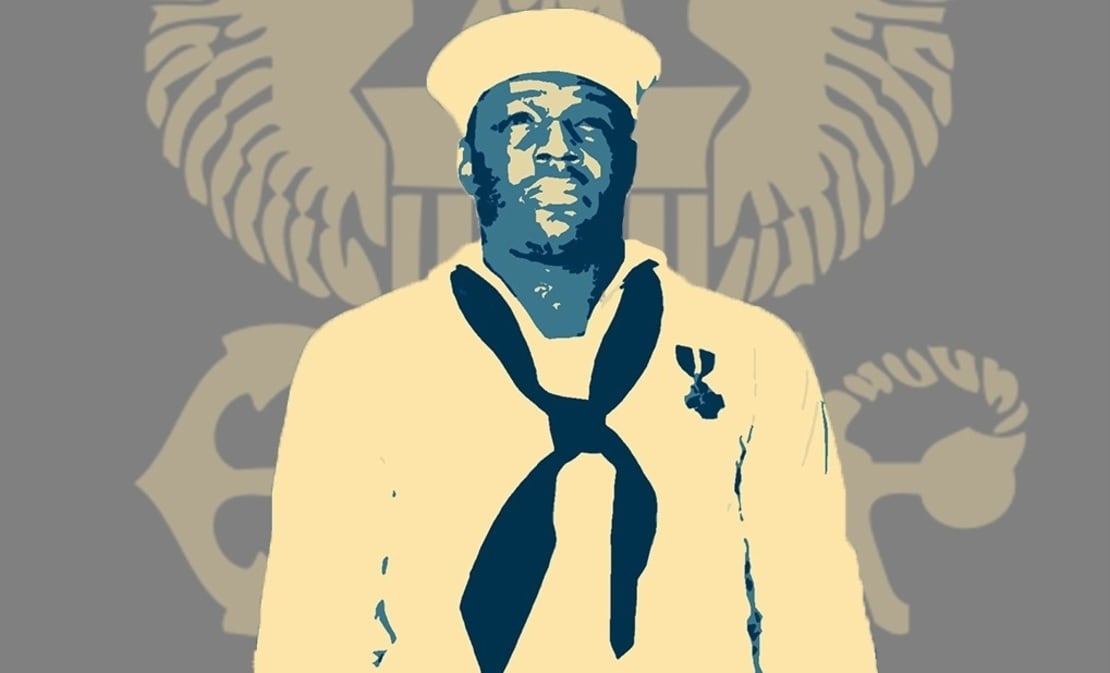During an emotional Monday ceremony in Pearl Harbor, Acting Navy Secretary Thomas Modly honored the legacy of World War II hero Doris Miller by bestowing his name on a future aircraft carrier.
It marks the first time a flattop has paid homage to an African American, a Navy Cross recipient and an enlisted service member. And it was decreed on a day set aside to remember the Rev. Martin Luther King Jr. and his lifelong crusade to end racial discrimination across the United States.
With the USS Arizona Memorial his backdrop, Modly sketched how Miller rose to battle on the morning of Dec. 7, 1941, a mess attendant in a racially segregated rating that made African American men servants to white officers.
Instead of collecting the morning’s laundry, Miller carried wounded shipmates from the blazing battleship West Virginia after it was hit by enemy fire. He fought the flames as they erupted on the vessel and then manned a .50 caliber machine gun — a weapon he never operated previously — to swat away Japanese planes during the ongoing surprise attack that launched the United States into World War II.
His ammo spent and ordered to abandon ship, he was one of the last three sailors to escape the West Virginia.
Advanced to mess attendant first class on June 1, 1942, and awarded the Navy Cross for combat valor, Miller was killed 17 months later when a Japanese submarine sank the escort carrier Liscome Bay off Makin Atoll during the invasion of the Gilbert Islands.
“He died as he lived, an American sailor defending his nation, shoulder to shoulder with his shipmates, until the end," said Modly. "Dorie Miller stood for everything that is good about our nation. His story deserves to be remembered and repeated wherever our people continue to stand the watch today.
“He’s not just the story of one sailor. It is the story of our Navy, of our nation and our ongoing struggle to form — in the words of our Constitution — a more perfect union.”
RELATED

The future aircraft carrier Miller won’t be the first Navy vessel to honor the hero. On June 20, 1973, the Navy commissioned the destroyer escort Miller — which was reclassified as a frigate two years later.
Modly said that when completed, the new Doris Miller, a Gerald R. Ford-class carrier, will be the most powerful and lethal warship ever built by man.
Designed to operate deep into the 21st century, more than 100,000 officers and crew will serve on the carrier, many of them yet to be born.
The bulk of those sailors and Marines will be enlisted, the men and women Modly called “the steel spine of our ships.” He said the faces of a great and diverse crew will go with their carrier to every corner of the globe as a visible symbol of American values.
The name of the carrier also will remind the nation of its everlasting debt to the veterans of World War II who, like Miller, sacrificed so that future American generations would be free.
The acting secretary traced a similar journey Miller’s legacy took in the mid-20th century, from his day of courage in Pearl Harbor to a budding civil rights movement that leaned on him as an example to force a wartime nation to open up its defense plants to African Americans.
Modly pointed to the bitter irony of African American service members who fought tyranny abroad in World War II only to return home to a nation that denied them liberty simply because of the color of their skin.
He drew a moral arc from Miller’s heroism and quietly persuasive call for positive change during the war to the core message of Martin Luther King Jr.'s 1963 Letter from a Birmingham Jail: “Injustice anywhere is a threat to justice everywhere. We are caught in an inescapable network of mutuality, tied in a single garment of destiny.”
That same line continued to Aug. 28, 1963, on the National Mall, when King stood before the Lincoln Memorial and uttered his “I Have a Dream” speech to thousands of peaceful protesters during the March on Washington for Jobs and Freedom.
And then it all returned to Pearl Harbor, where Modly officially named a new carrier in Miller’s honor, only a short distance from where he became one of the first Americans to fight in World War II.
“In selecting this name, we honor the contributions of all our enlisted ranks, past and present, men and women, of every race, religion and background,” said Modly.
“Dr. Martin Luther King, Jr. observed, ‘Everybody can be great - because anybody can serve.' No one understands the importance and true meaning of service than those who have volunteered to put the needs of others above themselves.”
That spirit was bipartisan.
U.S. Rep. Bill Flores, a Republican who represents Miller’s hometown of Waco, pointed to the importance of a carrier named after an enlisted hero, saying that it will serve as inspiration to future generations of young service members.
Also born in segregated Waco but today representing Dallas, Rep. Eddie Bernice Johnson recalled hearing the tale of Miller’s heroism from her father.
She continues to spearhead the push on Capitol Hill and inside the Pentagon to upgrade Miller’s Navy Cross to the Medal of Honor.
“My journey’s not quite over," she said.
Prine came to Navy Times after stints at the San Diego Union-Tribune and Pittsburgh Tribune-Review. He served in the Marine Corps and the Pennsylvania Army National Guard. His awards include the Joseph Galloway Award for Distinguished Reporting on the military, a first prize from Investigative Reporters & Editors and the Combat Infantryman Badge.




